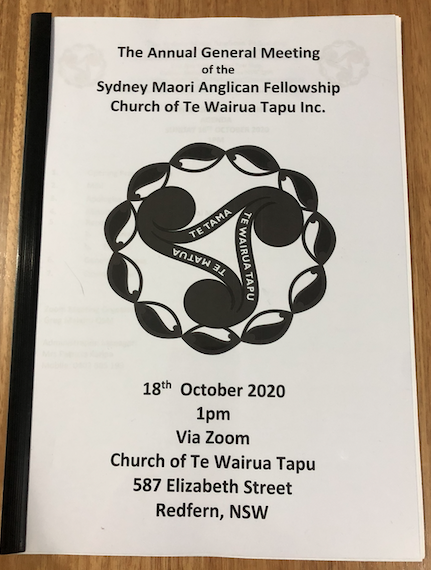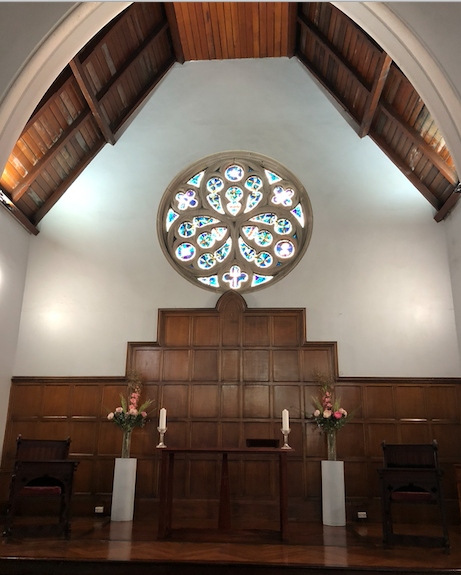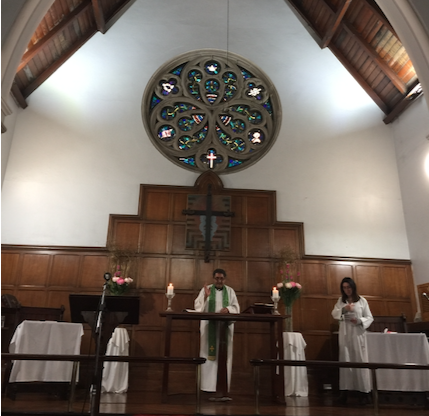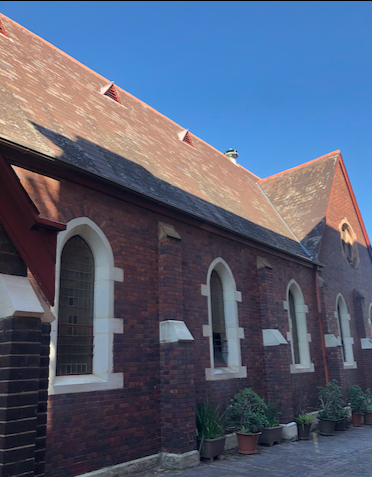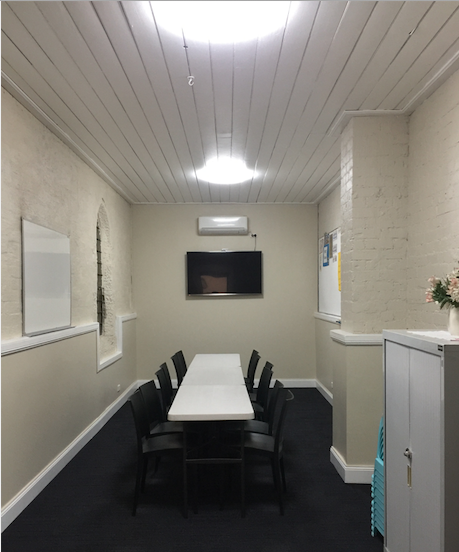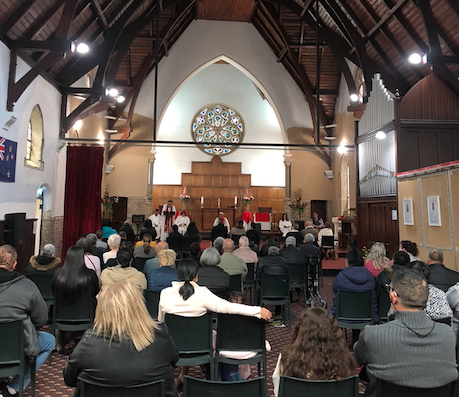
Builders of the Church
Readings:
Ecclesiasticus 44: 1-15
1Corinthians 3: 11-17
Matthew 5: 1-12
Sentence:
“Call to remembrance O Lord your tender care and the unfailing love which you have shown from of old.” Psalm 25: 5
Tena koutou katoa e te whanau o Te Wairua Tapu.
Well whanau, we returned to karakia at Te Wairua Tapu today for our first service back since March. 7 months ago. And what a way to return. Today we celebrate 35 years of having this magnificent building to worship God, which was originally built in 1888 by the Scottish Catholic Apostolic Church, 132 years ago. So we give thanks to God for the Scottish Catholic congregation for having great faith and vision that this building would provide a shelter and a home for many of God’s people, including us, the Māori community of Sydney. Due to Covid restrictions numbers to attend were severely limited.
My kauwhau today is more of a historical overview of our association with our church building in Redfern.
On the 21st of October 1984: Sir Kingi Ihaka was commissioned as the first Chaplain to the Maori Community of Sydney at St Andrew’s Cathedral, Sydney. Following this service, the Blacktown Showgrounds was transformed into a marae to commemorate this historic occasion.
Almost a year later, on Sunday the 27th October 1985 – At 9.30 a.m. with a light shower falling, members of the church fellowship assembled at the Maori lawn section at Rookwood cemetery for the planting of two pohutukawa trees, with a simple service of thanksgiving and dedication. At 11.a.m., a service was held at St John’s Anglican Church, Glebe to say “thank you” and “farewell”, which was officiated by the Bishop of Aotearoa Whakahuihui Vercoe. At 3.00 p.m. a thanksgiving service and official entry into the church building at Redfern was held. During the service, a Chalice and Paten was presented to the Chaplain, which we still use today. Clergy present on that day included The Archbishop of Sydney, The Bishop of Aotearoa and at least 12 priests.
One Pakeha person present in the congregation that day said, “When Maori culture is enhanced by the addition of a Christian dimension, the experience can be electrifying. The official entry…….into a place of worship of their own in Redfern provided just such an exhilarating experience. Such is the joy and freedom Sydney’s Maori community showed on the occasion, that the service, while retaining the full reverence and dignity appropriate to Morning Prayer or Evensong, was a delight. It was made so by the enthusiastic participation of many members of the Fellowship and the extraordinary beautiful singing…….. It was a time for learning about and reaching a deeper understanding of each other, for sharing the joy and the glory of worshipping and thanking God for the many blessings, especially for the delight and warmth of fellowship with people of different backgrounds.”
Another person referred to his experience as, “I found it enriching to be among people who have little in the way of material goods, but very rich spiritually” And Bishop John Reid wrote, “It was a great occasion and we were greatly moved by the singing in Maori. I can honestly say that I have never seen such magnificent food at any Church function as I saw and enjoyed the hangi afterwards”
Finally, Sir Kingi Ihaka wrote, “We, the Maori people now own a beautiful treasure, a shelter. I greet you those who enfold this sacred building and all activities associated with it with loving embrace. May the spirit which emanates from Te Wairua Tapu bind us as a united people under the mana of God. There is no marae to compare with that of God, and so the Psalmist proclaimed: “ O how amiable are thy dwellings O Lord of hosts. My soul longs, yes, even faints for the marae of the Lord”
“By the grace of God, in a year, we have acquired for our use, a Church –Te Wairua Tapu, an assistant priest, the Rev Clark Walker. In a year, we have a small group of dedicated men who act as my assistants during the Divine Services and on other occasions; a dedicated band of men and women who “give and do not count the cost, and labour without asking for any reward”. In a year we have created a strong family spirit amongst members of the Fellowship. In a year, we have come to know more people –our very own kith and kin who live in scattered areas throughout the Diocese. In a year, we have achieved much more than we thought possible a year ago.”
After serving two and half years, Sir Kingi Ihaka returned to NZ in May of 1987. In his last chaplain’s report he wrote, “I thank all those who have in any way assisted me in my ministry here in Sydney. Our community is not a non-religious one. We have no “unbelievers” amongst the Maori. We have never, even before the introduction of Christianity in New Zealand. The Maori always worshipped a God. My mission which is not mine alone, but ours, is to renew that worshipping spirit amongst our people here in Sydney. I believe that we are “no longer aliens” in a foreign land, but fellow citizens with God’s people, and members of God’s household built upon the foundation laid by the Apostles and Prophets, Christ Jesus Himself being the foundation stone……..” “The time has come for me to say “Noho ake ra” which does not mean “goodbye” but “remain here in peace”, for without peace in your hearts, peace in your homes, nothing can be achieved that is of real value. I owe a debt of gratitude. I would love to leave Sydney knowing that together, even though a minority group, we have laid a sure foundation amongst our people for the extension of God’s Kingdom…..To all who have supported me, please accept my sincere aroha………. Remember the good things done and the little that has been accomplished, giving praise to Almighty God, and may you all continue to be “steadfast, unmoveable, always abounding in the work of our Lord”.
On October 27th 1987: Rev. Te Wheoki (Jim) Tahere was commissioned as the 2nd Chaplain to the Maori Community of Sydney by Archbishop Donald Robinson. This day marked the 2nd anniversary of “Te Wairua Tapu”. Rev Tahere made it abundantly clear: that service, pastoral care and teaching were high on his Ministry agenda. At his commissioning service Rev Tahere said that during his 5 year tenure he would aim to engender or bring about caring and loving relationships within the congregation. Rev Tahere on his succession to Sir Kingi Ihaka wrote, “Now there is indeed much cause for thanksgiving, for Kingi left behind a Constitution to guide you, this Church to worship God in, as well as re-establishing the bonds of fellowship with each other and equally important your own Cemetery ….In his short time here, from October 1984 to May 1987, he has achieved much more and I thank God for his ministry with you……..” “My reason for coming to you is the same as when I offered myself for the Sacred Ministry over 30 years ago, and that is my desire to please the Lord of Hosts, Te Atua o Nga Mano, in faithful service to His Ecclesia or Fellowship……..”
During Jim’s tenure, Constituitional changes allowed women to be nominated to the position of Elder. Approval from the Diocese of Sydney was given for 3 Lay Assistants. Mrs Puanga Ratapu, Steven James and myself. Also, transformation to this building began. Members of the fellowship and volunteers worked tirelessly to bring the church up to an acceptable standard. Our sign was erected on the outside of the building, which might not be a big thing now but it was then. A dedicated band of workers spent a Friday and Saturday painting the entire interior of the building ready for karakia the next day. Permission was granted to divide the church building with curtains. As it is today. The front half to be used as a chapel proper with the nave, the back half, to be used as a wharenui. Tukutuku panels and kowhaiwhai panels were created to separate the two areas.
Just over five years, in January 1994: Rev Silas Horton, an Australian priest, was appointed Acting Chaplain to the Maori Community upon the death of Rev Tahere in NZ on the 15th January 1994, while attending a education program with members from the fellowship.
On the 17th July 1994: The Rev. Ngarahu Katene was commissioned as the 3rd Chaplain to the Maori Community of Sydney. In attendance were Bishop of Aotearoa, the Most Rev. Vercoe, Archbishop of Sydney, the Most Rev Harry Goodhue and the acting chaplain Rev. Silas Horton. During Ngarahu’s tenure, The Sydney Maori Arohanui Fellowship name was changed to The Sydney Maori Anglican Fellowship. This came about because other Maori Churches had established their own Haahi in Sydney.
However, Ngarahu brought with him the gift of music. That was his ministry. His choir gained a reputation throughout Sydney performing at the Town Hall, Cross Culture Services at Petersham, the Wesley Centre, Pitt Street to name a few. The inclusion of Ted Bennett as Choir Master added to the choir’s future growth and success. Ngarahu quoted, “The Te Wairua Church building has served us well and I cannot deny that we would not be the growing vibrant fellowship we are, if it were not for this humble building………we continue to enjoy our stay in Sydney and all the challenges associated with being the Chaplain to the Maori People. It is so heartening to feel the support, to see the growth and to enter the activities…………..”
Ngarahu and members of the fellowship travelled extensively. The group went to Brisbane to attend the induction of Rev Allan Broughton to lead the Māori mission there and they also attended a Winter Ministry School in Brisbane where three members from Sydney were commissioned as Kaikarakia to the Pihopatanga O Aotearoa. Purua Solomon, Ben Matthews and Steven Maniapoto. They also attended the ordination of Ray Ponui to the Priesthood at Orakei Marae, Auckland and also the ordination of Bill Muru, Nigel Leef and myself to the diaconate at Nga Whare Watea Marae in South Auckland. In July 1998: Ngarahu and members from the fellowship travelled to Kaitaia for ordination to the Priesthood of Bill Muru and myself.
Ngarahu and the fellowship were also involved with the Senior Citizens from the Anglican Village in Castle Hill. The Goldie Exhibition that came to Sydney and this building became the centre in which many tangihanga and community hui were held. Due to the spiritual, physical and financial stress on the fellowship at that time, Ngarahu wrote in his 1999 chaplain’s report. “Well, we are in the new Millenium, what has it got to offer. I believe it offers us plenty, but we have to go out and make it happen. We cannot sit back and let the few faithful struggle on their own, we all have to pull our weight. There are a lot of changes about to happen. Let us all and others, and I mean all, as one, accept the challenges, by acknowledging the changes, and making it work for a better future for “Te Wairua Tapu”. Not for me or for the next Chaplain, but for this place, Te Wairua Tapu and ultimately, to the glory of God”.
Today, Ngarahu is the Bishop of Te Mana o Te Wheke in Aotearoa. I want to acknowledge Bishop Ngarahu and his late wife Kay as they both followed and supported my faith journey from the time I left Sydney in 1996 to the time my family and I returned in December 2000 to be commissioned as the fourth Chaplain to the Maori Community of Sydney almost 20 years ago.
In my first Chaplain’s Report, I wrote, “All our efforts to enter the Kingdom of God calls us to “enter through the narrow gate” (Luke 13:24) our desire to know this person Jesus and to follow him diligently always comes at a heavy cost. Our walk in faith teaches us to be strong in times of struggle”.
“My aim is to work on developing mutual relationships built on respect, trust, love and accountability towards each other. This means working on both relationships within the Fellowship and relationships outside our community of faith. I’m also a realist who knows that building these relationships will take time and it will not be easy. There are lots of struggles and challenges, which lay ahead for the Fellowship but one thing is certain, no matter the outcome, let everything we do be to the glory of God.” “Loving God, your son willingly endured agony and shame for us. Give us grace to take up our cross and follow him in newness of life and hope; for he is our Redeemer”.
35 years on, this Fellowship still faces many challenges and struggles, yet, we remain faithful to our Lord and Saviour Jesus Christ and we continue to give too and love our own people, God’s people. Through this mission and this building, Te Wairua Tapu, we have seen the likes of Pat Armstrong, James Walker-Grace, Ray Ponui, Tom Poata, Beverley Moana-Smith, Karol Field, Tuterangi Whiu, Cherie Whiu, Rapiata Hokianga, Fran Hokianga, Lorraine Waititi and myself, go on to be ordained as priests or deacons and to serve Christ and his church.
So, I want to humbly acknowledge all the Whanau of the priests whom have been involved with this mission as they are the ones that have carried the burden of our ministries: Kingi Ihaka’s son Tom and his wife Ngarangi, Clark Walker’s wife Caroline and their whanau, Jim Tahere’s wife Charlotte and their children, Matua Bill’s wife Julie and his whanau, Ngarahu’s wife Kay and their extended whanau and myself, my wife Pat and my son Nathan. And of course all the other extended whanau who have worked tirelessly and unselfishly throughout the past 35 years.
You see, when stories are told, so many people get left out so I want to thank all of you and the many whom are not present today that have upheld this mission and kept our building worthy of the worship of God. To the current building team: Derek Tallon, Pierre Hau, Greg Patchett, Terry Brown, Miriam Perry, my wife Pat and all their supporters who have helped them take the renovations of Te Wairua Tapu to the next level so it can be worthy of the worship of God for the next 100 years, which now leads me back to our gospel from Matthew. It is the very reason why Te Wairua Tapu was given to us, so we, as followers and servants of Jesus Christ can see what he and God sees and be present with others because:
‘Blessed are the poor in spirit, for theirs is the kingdom of heaven.
‘Blessed are those who mourn, for they will be comforted.
‘Blessed are the meek, for they will inherit the earth.
‘Blessed are those who hunger and thirst for righteousness, for they will be filled.
‘Blessed are the merciful, for they will receive mercy.
‘Blessed are the pure in heart, for they will see God.
‘Blessed are the peacemakers, for they will be called children of God.
‘Blessed are those who are persecuted for righteousness’ sake, for theirs is the kingdom of heaven.
‘Blessed are you when people revile you and persecute you and utter all kinds of evil against you falsely on my account. Rejoice and be glad, for your reward is great in heaven, for in the same way they persecuted the prophets who were before you.
So in closing, we returned to Te Wairua Tapu today not looking for any glory for ourselves but to give all glory to God and Jesus Christ for saving us from ourselves and giving us renewed lives to continue proclaiming the gospel here in Sydney. May God bless you all today, tomorrow and forevermore. Amen
The Venerable Kaio Karipa
Chaplain
Sydney Maori Anglican Fellowship Church of Te Wairua Tapu
www.tewairuatapu.com.au

